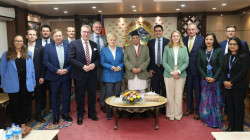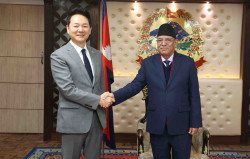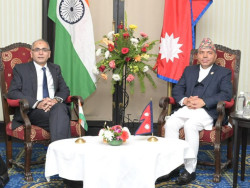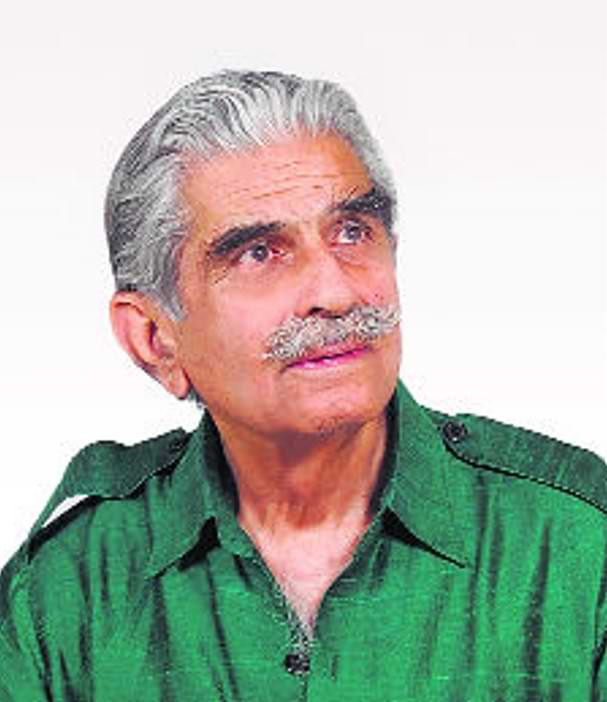Foreign Affairs
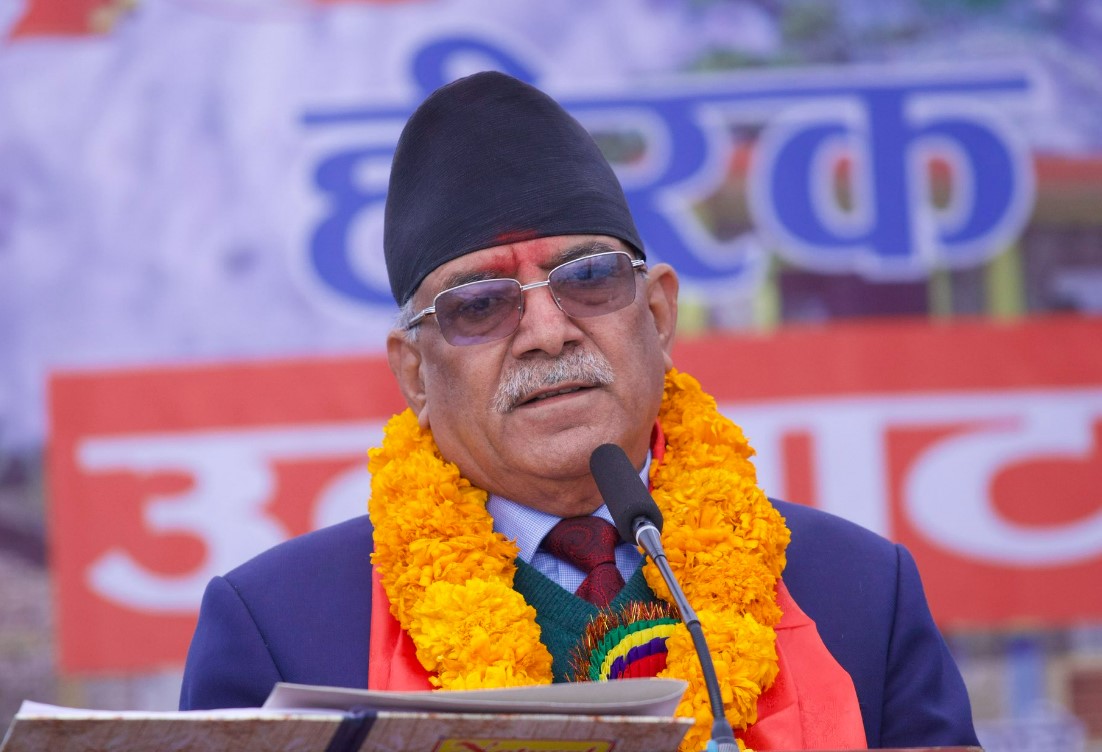
Reaction of my friend Yam Bahadur Gurung in Lame Ahal near Pokhara on Prachanda becoming Prime Minister was this: “No big surprise, even if his party won just 32 of the 275 seats in Parliament.” According to him, it was expected: either Prachanda, an otherwise kingmaker remained in the Nepali Congress-led alliance or joined the alliance led by KP Oli the dark horse, who turned out to be an indomitable kingmaker, as long as he got to become the prime minister, first. No surprise even for former prime minister Sher Bahadur Deuba who had previously shared power with Prachanda in 2017.
The surprise for many was that Deuba was unable to accommodate Prachanda as first prime minister and save the coalition. Prachanda’s craving and resolve to be a third-time prime minister was not taken seriously by Nepali Congress stalwarts. That Prachanda would break the alliance to achieve his ambition was also no secret. From the moment, Maoists discovered their score was a lowly 32 seats, Prachanda’s people went about strengthening his bargaining power by roping in likely allies like Dr CK Raut’s Janmat Party, Resham Chaudhary’s Nagarik Unmukti Party and several independents. Online Khabar reported that Prachanda commanded 60 seats. His ‘ministers of propaganda’ claimed the number was 80. That might have been the case with Rabi Lamichhane-led Rashtriya Swatantra Party.
Co-equals
Even before the Election Commission declared results, Maoist leader KB Mahara announced: “all options were open” but soon rescinded the statement confirming Maoist Centre would stick with the NC Gathbandhan. They signed a press release affirming their commitment to a NC-led coalition. Prachanda waited till Deuba was declared NC’s parliamentary party leader by defeating his main challenger, Congress General Secretary Gagan Thapa.
On D-Day (December 25), after a two-hour meeting at Baluwatar between Deuba, Prachanda and Madhav Nepal, Deuba refused to budge on letting Prachanda be the first prime minister. Upon which, Prachanda drove straight to Oli’s Balkot residence where Rajendra Lingden (RPP) Ashok Rai (JSP) and Rabi Lamchhane were already present with Oli. Upendra Yadav joined later.
When Prachanda arrived, he was seated adjacent to Oli denoting his subordinate position. After the seven-party alliance recognised Prachanda as the first prime minister in a power-sharing deal with Oli, his chair was shifted alongside with Oli signifying co-equals. Signatories to the deal were leaders of the seven parties.
Surprise
Armed with signatures of 166 Members of Parliament, Prachanda drove to Sheetal Niwas before 5 PM on Christmas Day, the deadline set by President Bidhya Devi Bhandari to present a claim to premiership under Article 176(2) of the Constitution of Nepal. On Boxing Day, Prachanda was sworn in as the 44th PM of Nepal, 14th in the last 10 years, at 4 PM, Nepal Standard Time. Six ministers including three deputy Prime Ministers, one each from UML Bishnu Paudel (Finance); Maoist party Narayankaji Shrestha (Infrastructure); and RSP’s Rabi Lamichhane (Home) also took oath of office. The sputnik rise of the non-ideological Lamchhane, a former anchor of TV News24, was the grandest surprise. This bizarre coalition of Left, Right and Centre, of pro-monarchists and anti-monarchists, will be a colossal project for Prachanda to manage.
Not to be accused of interfering in domestic politics, India steered clear of micromanaging government formation. BJP’s in charge of foreign affairs cell Vijay Chouthaiwale, now more famous as the person on whom Deuba’s wife Arzu Rana had tied a rakhi this year, said India would like to see stability and continuity but would accept whoever Nepalis choose as the prime minister. Though a product of a no-holds-barred electoral system, Prachanda is not a courtesy mandate of the people.
But all is fair in love and politics. Prachanda told ANI TV that Prime Minister Narendra Modi was the first to congratulate him and had invited him to visit India. The Chinese were not far behind. The Chinese Embassy in Kathmandu issued a statement claiming that no Chinese leader met any Nepali politician to influence government formation. Beijing, even without trying, was gifted on a platter a Left-leaning government though both Prachanda and Oli are no longer committed communists and sensitive to India’s national interests and security concerns. China will make much of the “Xi Jinping Thought” preached openly last year.
Dramatic return
The dramatic return of Prachanda is a legend. The awesome Maoist commander who led “not from the front” in the civil war but inspired comrades to pull off a near battlefield victory but for India’s intervention and the second debacle at Khara in 2005. The second disastrous battle of Khara was the turning point of the war and rehabilitation of party ideologue Baburam Bhattarai, who persuaded the party to combine ballot with bullet, to score a resounding political victory with 229 seats (in 1991 Mashal, a previous avatar of the Maoists with 9 seats) in a 601-member Constituent Assembly in 2008.
Crowned as Prime Minister, Prachanda attempted an urban revolution, aiming at capturing the state institutions which was his undoing. Here again, India prevented this from happening. India’s National Security Advisor, Shiv Shankar Menon then outlined New Delhi’s mission in Nepal as “mainstreaming Maoists and democratising Nepal”. That is still a work in progress.
Due to its brutality, ignoring human rights and indulging in steep corruption, Maoists witnessed immediate political decline. In the subsequent elections, their seat share fell to 83, 51 and now 32, respectively. It is power that Prachanda has chased without moral course correction and ideological compass reset. Who knows it may be overtaken by RSP or RPP unless there is a grassroot overhaul.
Contradictions in Nepali politics are stark. On 14 November, while campaigning in Nepal’s Lamjung district, Prachanda said he would never join hands with erstwhile coalition partner, KP Sharma Oli, who was a danger to democracy and had badly betrayed Prachanda. “He (Oli) had been trying to rule like Hitler”. Days later, Oli thundered from his Balkot verandah that he would never let Prachanda become the PM. But on 25 November, the personal staff of both Dahal and Oli said the two leaders had spoken to each other. Dahal’s personal secretary, Ramesh Malla, recounted the conversation to Online Khabar. “He (Oli) said ‘let’s work together’. But how that is going to happen wasn’t made clear” Malla was quoted as saying.
India factor
The reconciliation of Oli and Prachanda testifies to the adage: no permanent friends or enemies, only permanent interests. Both leaders have worked with India and China and have swayed with the wind. At a meeting with me in 2010, Prachanda admitted having told a Nepal TV channel that Nepal needed China to balance India. Later, at another meeting, he noted: “India is more important for Nepal than China”. Prachanda has matured since his first short-lived term as Prime Minister, having subsequently shared power with Oli and Deuba. But this time, he has a Himalayan mission of managing neighbours whose relations are extremely stressed following clashes in Ladakh and Tawang.
Oli has worked with India, too. After a tempestuous relationship in mid-2021, India reset relations with Oli with an avalanche of visits starting with R&AW chief Samanta Goyal, Army Chief Gen Naravane, and Foreign Secretary Harsh Shringla. Both Oli and Prachanda will focus on geo-economics, rather than geo-politics, recognising India as the fastest-growing economy in the world.
The first item on the agenda after winning the vote of confidence in the days ahead will be deciding on Agnipath’s truncated recruitment terms. Maoists have periodically criticised the country’s policy of letting Nepali youth join foreign armies especially, the Indian Army. The government of India could easily please Nepali Indian ex-servicemen community and youth by a single act of generosity – exempting 1200 Nepalis annually from Agnipath scheme and winning hearts and minds of Nepal and the Nepalis.
